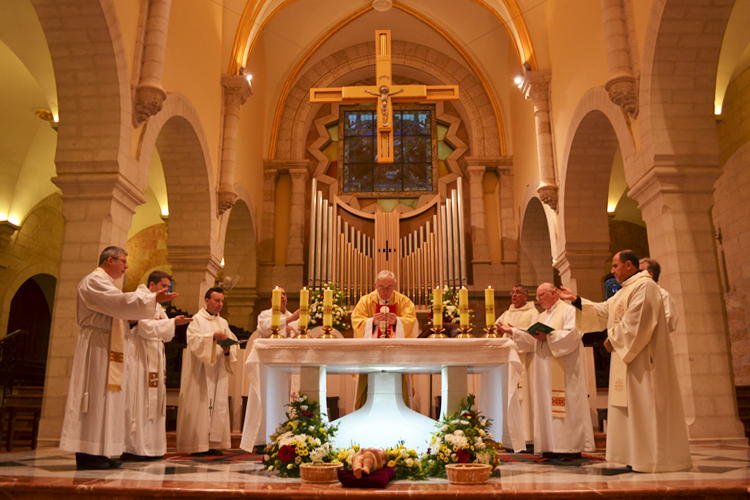
What is the Sacred Liturgy?
The sacred liturgy is the true worship of God, enacted by Jesus Christ and his body, the Church, through the power of the Holy Spirit. It is a shared ‘public work’ (leitourgia) with ceremonies, rites and formulas established by Scripture and Tradition.
Why does the Church have liturgy?
The Church has liturgy in obedience to the will of God, most clearly expressed by Christ’s command, “Do this in remembrance of me” (Luke 22:19). As the true worship of God, the Church’s liturgy follows the ceremonies, rites and formulas established by Scripture and Tradition where the will of God is revealed. Liturgy involves common prayers, visual signs, symbolic actions, sacred music and the proclamation of Scripture.
The liturgies of the Church
The principal liturgies of the Church are those of the Eucharist and the other sacraments. All these are led by sacred ministers, usually priests, and consist of official prayers, Scripture and sacramental actions. The liturgies of the Divine Office contain the prayers that priests, religious and many lay people pray several times each day – they consist mainly of the psalms. Other liturgical rites include the Rite of Christian Initiation for Adults (RCIA) and Benediction for the worship of the Eucharist.
When is liturgy celebrated?
Liturgy follows set times and seasons. Advent is the four-week period when we prepare for the coming of Jesus at Christmas and for his final coming at the end of time. Lent is the forty day period of prayer, fasting and almsgiving that follows the pattern of Jesus’ own fast in the desert. Holy Week and Easter are when we celebrate his redemptive death and Resurrection. Ordinary time covers the rest of the Liturgical Year.
During the week, Sunday, the day of the Resurrection, is the most holy day. To attend Mass on Sunday and certain Holy Days is obligatory for all those capable of doing so.
What are the Sacraments?
Sacraments are signs established by Christ that cause what they signify. They heal us from sin and plant, nourish or restore the life of grace in us.
Why are sacraments important?
The sacraments are important because they make the power of the Paschal mystery of Jesus present to us for the sake of salvation. By these seven channels of grace, God makes us his adopted children and increases his life of grace within us.
The Seven Sacraments touch all the stages and all the important moments of Christian life: they give birth and increase, healing and mission to the Christian’s life of Faith. There is thus a certain resemblance between the stages of natural life and the stages of the spiritual life. ccc. 1210
What are the sacraments and their effects?
Baptism
The minister pours water over the head of the candidate saying, “I baptise you in the name of the Father, and of the Son, and of the Holy Spirit.” The effect is the forgiveness of sins, the new life of grace and membership of the Church.
Confirmation
The minister anoints a person’s forehead with chrism saying, “Be sealed with the gift of the Holy Spirit.” The effect is the sealing with the Holy Spirit for the mature Christian life.
Eucharist
The priest consecrates bread and wine saying, “This is my body which will be given up for you…; this is the cup of my blood…” The effect is the Real Presence; Sacrifice of Calvary re-presented; spiritual food.
Confession
The penitent confesses sins with sorrow and repentance. The priest gives absolution, “I absolve you from your sins…” The effect is the forgiveness of sins and restoration of grace.
Anointing
The priest anoints the sick person’s forehead and hands with oil, praying the prescribed words. The effect is the forgiveness of sins, spiritual strength and healing.
Holy Orders
The bishop lays hands on the candidate’s head and prays the prayer of consecration. The effect is the ordination of a minister to act in the person of Christ.
Marriage
The spouses express their consent to one another following the prescribed canonical form, usually before a priest. The effect is the union of the spouses as Christ is united to the Church.
This article is originally from ‘CREDO: The Catholic Faith explained’ by CTS.